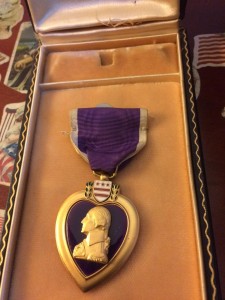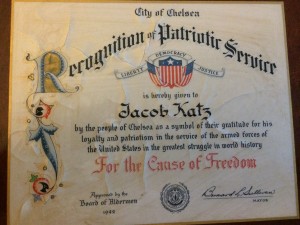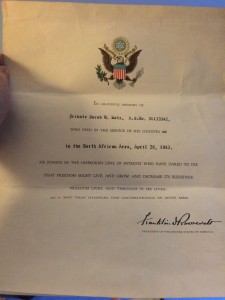I’ve been thinking a lot lately about my maternal grandfather, Louis Segal. This decorated veteran died 19 years ago, and I keep thinking of the things I wish we could talk about today.
Mood music:
Papa, as we called him, asked me to take him for a ride to the bank the evening before he died. He got into the car and declared that he felt like “the last rose of summer.” I think he knew he was about to go, and wanted to pull out some cash to buy the family breakfast one last time. In the car, he told me and Erin about life as a kid.
The next afternoon, he took one last deep inhale, and that was that. He died in his favorite living room recliner after a very pleasant morning with family. I wasn’t there, but was told about it. He gave one of my cousins a ten-dollar bill just for the hell of it. I don’t remember where I was, but I can tell you that wherever I was, I was thinking about no one but myself. That’s how I was back then.
Papa loved to chomp on a good cigar and eat things that were bad for him. It used to make me angry, but today I think he was just trying to live life to the fullest he could. He had parachuted into France ahead of the D-Day invasion in June of 1944. He was at the Battle of the Bulge that December. He took a bullet or two in the leg in Korea. He boxed in the Army and they called him “Silent Segal” because he would take it on the chin quietly. He also beat down his opponents quietly.
I often wonder what he’d have thought of the movie “Saving Private Ryan,” which came out two years after he died. The beginning of the film is bone-chilling and almost beautiful in its rawness. You see scenes of soldiers lying on the beach with their intestines hanging out and you try with all your mental might to grasp what it must have felt like to be in the middle of that chaos. My grandfather was there, and could have given me the appropriate description.
He liked watching M.A.S.H., as I do. If he were here today, we could laugh over some of the show’s funnier moments. He’d also tell me all the ways the show was bullshit when stacked against reality.
I definitely appreciated him when he was around. He was my Papa and I loved him, after all. But I wish I had engaged him more about the stories of his military service. I was a young punk back then, and like all young punks I was too busy thinking of myself to spend more time with him.
The lesson of this post if to appreciate the older people in your life. Hug them. Learn from them. Enjoy their stories.
And, if you’re into it, smoke a cigar with them.
Thanks, Papa, for your many years of service.




